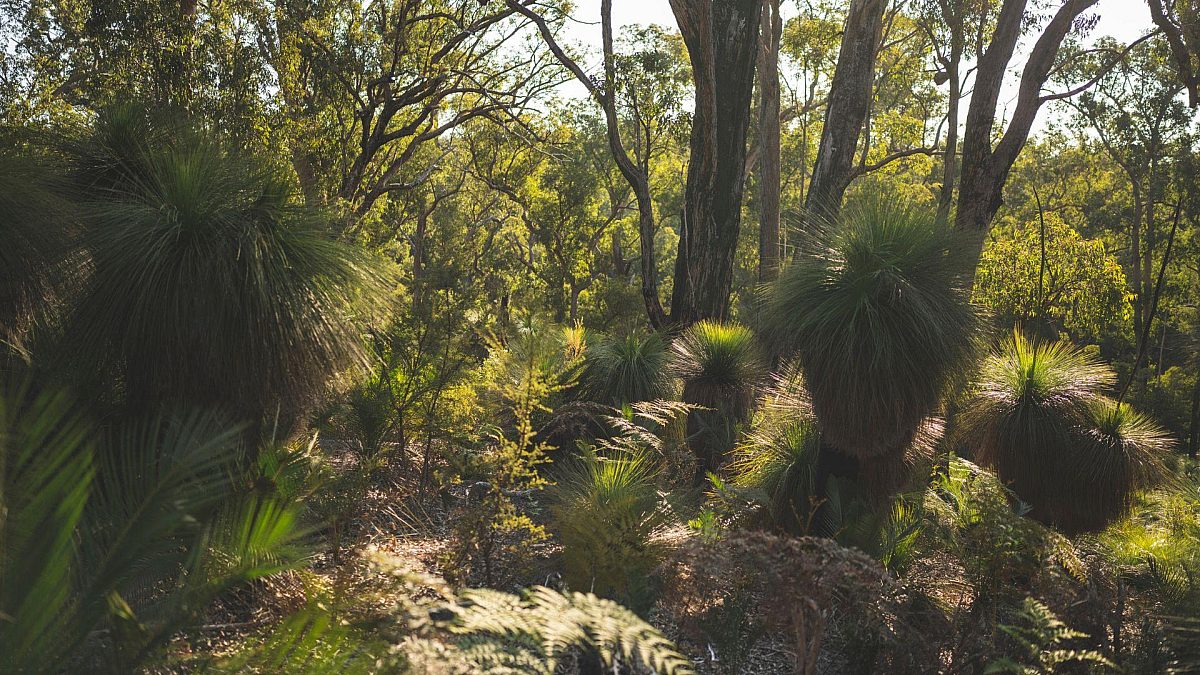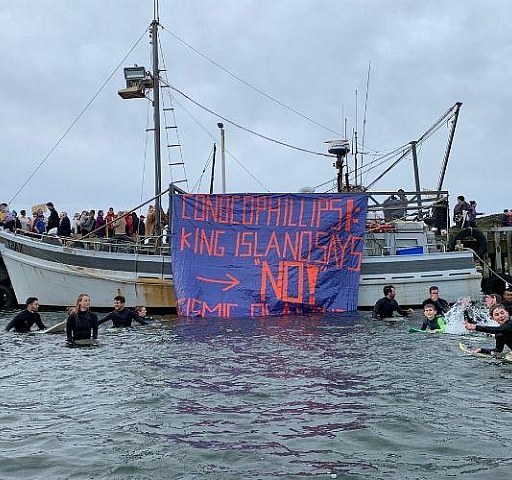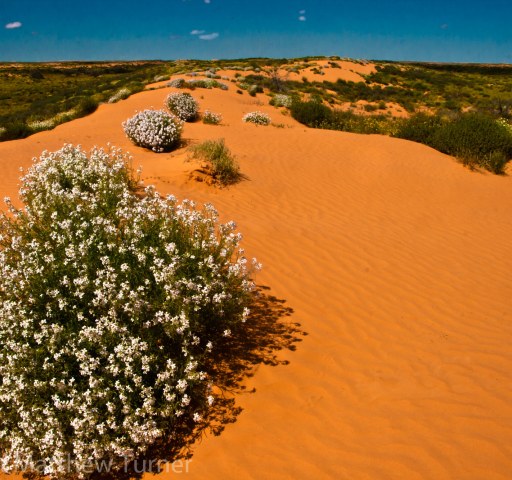Your support in action
To stop the climate and extinction crises, we need to end the mindless expansion of the fossil fuel industry, put an end to deforestation and land clearing, and give nature the strong legal protections it needs.

A year of big wins for nature
From helping to protect World Heritage in the Blue Mountains and lutruwita / Tasmania, to delivering the biggest national park ever created in Australia, calling out Queensland's shocking levels of deforestation and helping communities oppose fossil fuels on their doorstep, it's been a busy year!

A warm welcome to this Annual Review. With your support, The Wilderness Society has seen great success across our campaigns, while behind the scenes we’ve been laying the foundations for the future.
A major step taken has been the signing of a collaborative agreement by The Wilderness Society Ltd and national campaign centres. The agreement provides a solid framework to deliver the ambitious goals set out in our continental campaign plan introduced last year—it’s our roadmap to bring clarity and momentum to our shared work to protect, promote and restore nature across Australia. This work is delivering already, with lots of big wins for nature as you’ll see over these pages.
Without people like you there wouldn’t be a Wilderness Society. The power of community was brought home to me during the 2022 federal election. Hundreds of people went door to door to engage on key issues of concern. It changed the make-up of the parliament to now reflect what the people want: strong protections for nature and action on climate change. Graduates of the Wilderness Society’s community organising training used their skills to help get their local candidates elected!
People need strong community rights to be able to have a genuine say about the environmental issues affecting them. However, the system is currently rigged in favour of destructive industries with deep pockets. Below you can read about some of the steps we are taking to deliver systemic change on this front that will ensure community voices get a real say in environmental decision-making.
The Wilderness Society’s Board and staff meet regularly to discuss new ways to expand the diversity of the organisation across its members, governors, staff and volunteers. This enables the Wilderness Society to be a broad tent, a place where people from diverse backgrounds can feel included.
Finally, I often hear stories that make me so proud of the work we’re doing. I was encouraged recently by something a colleague told me about a supporter: each month she picks three charities to support; each month she researches to make sure her support is going to a place that will use it most effectively; each month she picks the Wilderness Society. We are delivering for nature, and thanks to your continued support we are more effective than ever.
Leanne Craze AM

Convenor, The Wilderness Society Ltd
WA Community Organiser Stephanie Poly on the need to give people a real voice with strong environmental community rights.

“It’s important for communities and First Nations groups to have strong community rights in environmental decision-making, because they are the ones who will have to live with any negative consequences. And being involved in the process means that a community can bring forward their local expertise and ideas, voice concerns, and have some influence over decisions that industry proponents typically steer.
“Between April and May, the Wilderness Society’s community organising teams worked with over 90 volunteers to hold seven community rights forums. We were able to reach communities all over Australia. More than 200 people participated and 40 federal candidates were made aware of the events. Our event in May, hosted by the Fremantle Wilderness Society group, was a great success—with many community members saying they can now see environmental issues through a human rights lens, and better share the systemic issues that enable destructive projects to go ahead.
“Right now, community organising teams across Australia are holding stalls, hosting community forums and having meaningful conversations within their communities. By raising awareness of this issue, we’re hoping to build a strong case around the need for community rights, to ultimately get it built into environmental laws and business practices. Because when the community is involved in government and corporate decisions about the environment, there are better outcomes for climate, nature and people.”

This December marks 40 years since the Tasmanian Wilderness became a World Heritage area—it would prove pivotal in winning the Franklin campaign. Today, the Wilderness Society is seeking lasting protections for remarkable places all over the continent, and passionately continuing to defend the integrity of those, like the World Heritage of lutruwita / Tasmania, that make up our legacy.
A never-say-die attitude was forged in the fight to save the Franklin, and that same spirit has helped see our staff and volunteers through the year—and perhaps for you, too. In the immortal words of the Grateful Dead, what a long, strange trip it’s been. I’m proud of the resounding successes we’ve delivered through a difficult year.
To achieve our purpose, the Wilderness Society needs to share its vision with as broad and as diverse a range of people as possible. We do this by taking deeper dives, with stories of nature and people in Wilderness Journal for instance, inaugurally published in print in December 2021. We do this through Nature Book Week, where this year we launched the Karajia Award for First Nations children’s authors and illustrators. Karajia is a Mirning word for storyteller, and we are thankful to Mirning Elder Bunna Lawrie for generously contributing the name and for being a judge.
Our work is made possible through our relationships with communities across Australia via our community organising program and campaigning. In March, I was lucky to join the local community and a group of amazing trail runners to raise funds and awareness to oppose Santos’ plans to drill for gas in the lands of the Gomeroi people in the Pilliga Forest.
In 2023 there is a huge opportunity to deliver some of the systemic change needed to protect, respect and restore special places that are the focus of our work. These places are all globally significant with extraordinary cultural and natural values, and represent critical habitat for unique species of plants and animals. With a new federal government, we are closer to seeing strong new nature laws delivered, something we’ve been advocating for years.
The government’s commitment to protect 30% of Australia’s land and seas by 2030—as part of the international 30x30 initiative—further reinforces the need for our work to protect these large, intact ecosystems. With your support we are working alongside Traditional Custodians and local communities to stop the industrialisation of these iconic places.
Together with you, the Wilderness Society will be doing everything we can to get stronger environmental laws in place over the coming months, and we look forward to continuing to leverage all the opportunities we have to protect nature in the years ahead.
Matt Brennan

CEO, The Wilderness Society Ltd

In September—for the first time in years—Wilderness Society campaigners from around the country gathered at beautiful teralina / Eaglehawk Neck in lutruwita / Tasmania. It was great to meet with colleagues in person to learn from recent achievements and to plan ahead. The overall feeling was one of celebration. With your support, the past year has seen big wins across our campaign portfolio, which shows that our continental strategy is delivering.
In July 2021, like others before it, fossil fuel giant Santos walked away from drilling the Great Australian Bight. Now, together with the Mirning people, we’re pursuing permanent protection for land and sea Country in this region.
Elsewhere, we’ve successfully campaigned to protect existing World Heritage areas from development.
Just months after defending their homes, farms and local forests from the climate-fuelled Black Summer Bushfires, Rylstone locals realised the NSW government planned to open coal mining leases on the cusp of Wollemi National Park and the Greater Blue Mountains World Heritage Area. Thankfully, together with the community and with your support, we prevailed: all three proposed coal leases were ruled out.
In lutruwita / Tasmania, the campaign to protect the integrity of the Tasmanian Wilderness World Heritage Area continues. In 2021, Wilderness Society Tasmania won in the Supreme Court, challenging the legality of the state government’s approval of helicopter-based tourism. And yet, the proponent still plans to go ahead. We’ll continue working with fishers, walkers, the palawa community, lawyers and supporters to call for an end to government policies that result in inappropriate proposals like this.
Earlier this year we launched our Community Rights in Environment Decision-making campaign. Initial polling showed more than 61% of respondents believe that governments rarely or never take the community’s views into account when making decisions that affect the environment.
The Albanese government was elected with a commitment to restore ‘trust and confidence in environmental decision-making’ as well as commitments to strong nature laws and an independent watchdog to enforce them. To do this, it needs to listen to the community.
As a founding member of the Places You Love Alliance, we have championed strong new nature laws for over a decade. Wilderness Society community teams held hundreds of meetings with MPs across the political spectrum about the need for new nature laws that actually reverse the wildlife extinction crisis and protect critical habitat. Now, we’re campaigning to make sure the Australian parliament doesn’t squib this once-in-a- generation opportunity to protect Australia’s biodiversity and globally significant ecosystems.

In 2021, one of the planet’s most significant large, intact, functioning ecosystems, Munga-Thirri / Simpson Desert, a significant victory, ongoing gas exploration is proposed for this area, likewise further to the north-east in the Channel County in Queensland. Protecting Kati-Thanda / Lake Eyre and the broader basin from destructive fossil fuel expansion will continue to be a key focus.
The mindless release of fossil fuel exploration licences continues to be a source of deep anxiety for communities across the country. In the past year we joined with the people of King Island off the coast of lutruwita, and people along the Surf Coast in Victoria, to sound the alarm about seismic testing in local waters.
In Queensland our billboards highlighted the state’s rampant deforestation, largely as a result of land clearing for beef production. We also took Australia’s shocking rates of deforestation to Europe, where we lobbied the EU Parliament in relation to new deforestation rules. These must be strong enough to prevent products riddled with biodiversity risk, like cardboard boxes made from Critically Endangered mountain ash forests, from entering supply chains.
In the Kimberley, Martuwarra / Fitzroy River—for Traditional Custodians a living, ancestral being—remains threatened by deforestation, fracking and mining. We are working with the Martuwarra Fitzroy River Council to secure cultural, scientific and conservation economies for the region, one of the largest intact tropical savannahs left on the planet.
With a cracking team of campaigners across this continent, and your ongoing support, we look forward to delivering more wins for wilderness this coming year.
Amelia Young

National Campaigns Director

To stop the climate and extinction crises, we need to end the mindless expansion of the fossil fuel industry, put an end to deforestation and land clearing, and give nature the strong legal protections it needs.

With their rich evolutionary history, abundance of unique flora and fauna, and deep significance for First Nations people, the places we focus on deserve respect—and care. Here is some of the important, recent work that’s safeguarding these iconic locations. All of it made possible by your support.

Despite the ongoing impact of COVID in the first half of the financial year 2021-22, and the inflationary pressures and recruitment challenges in the second half, The Wilderness Society Ltd produced another solid financial result. We have increased our fundraising income and spent more on our environmental campaigns and programs during a challenging period.
At the same time we’ve also strengthened our balance sheet by repaying borrowings and an upwards revaluation of land and building assets. Our secure financial footing supports the work of our continental campaign plan, and enables us to keep doing our important work in the face of macroeconomic challenges.
For the 2021-22 financial year, we delivered an operating surplus of $1.5m ($2.9m in 2020-21), after gain on revaluations the total comprehensive income is $2.6m. Total income fell to $11.9m ($12.3m in 2020-21) as the COVID subsidies concluded. Our face to face fundraising program continued to be impacted by lockdowns, but our total fundraising income increased on the back of strong bequest income. We are incredibly grateful for this support and thank all our donors for their ongoing generosity.
The Wilderness Society holds around 78% of the units in the Friends of the Wilderness Unit Trust, which owns property in Tasmania. The value of these assets increased by $1.1m based on an independent valuation of the land and buildings.
Overall spend on our environmental campaigns and programs increased by $700k to $5.1m ($4.4m in 2020-21), even though COVID still impacted our work and staff capacity through this period. We have also continued to increase our reserves to support ongoing campaigns and programs.
We continued to review our operational efficiency. Our governance finance and operating costs were 8.4% of total expenditures, compared to 9.6% in the prior year and 10.2% in the year before that. We increased our investment in fundraising activities to $4.1m ($3.8m in 2020-21), which supported our growth in fundraising income.

This financial information is extracted from the full Consolidated Financial Report of The Wilderness Society Ltd for the year ending 30 June 2022, which can be found here.
Take a look at past Financial results and Annual Reviews.